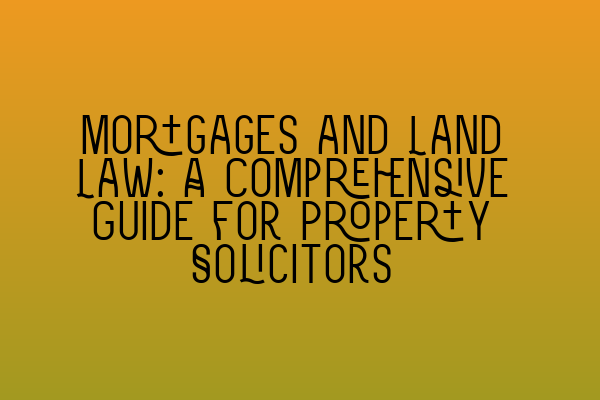Mortgages and Land Law: A Comprehensive Guide for Property Solicitors
As a property solicitor, having a good understanding of mortgages and land law is essential to effectively advise your clients and navigate the complexities of property transactions. In this comprehensive guide, we will explore the key concepts and principles of mortgages and land law, providing you with the knowledge you need to excel in your practice.
1. Introduction to Mortgages
A mortgage is a legal agreement between a lender and a borrower that allows the borrower to secure a loan using their property as collateral. This provides the lender with the right to take possession of the property if the borrower fails to repay the loan as agreed. Understanding the intricacies of mortgages is vital in ensuring your clients make informed decisions.
When advising clients on mortgages, it’s important to be familiar with the various types, such as fixed-rate mortgages, adjustable-rate mortgages, and interest-only mortgages. Each form has its own implications and risks, and being able to explain these to your clients will build trust and confidence in your expertise.
Furthermore, it’s crucial to be knowledgeable about the legal requirements and processes involved in mortgage transactions. This includes conducting searches, preparing mortgage documents, and registering the mortgage with the Land Registry. By understanding these procedures, you can guide your clients through a smooth and successful transaction.
2. Land Law and Property Ownership
Land law deals with the legal rights and obligations associated with land and the structures built on it. Being well-versed in land law will enable you to provide accurate and comprehensive advice on matters such as property ownership, rights of way, and boundary disputes.
One of the fundamental principles of land law is the concept of registered and unregistered land. Understanding the different legal requirements and implications for each type is essential. For instance, registered land is governed by the Land Registration Act 2002, which requires landowners to register their titles. On the other hand, unregistered land is subject to the older system of unregistered conveyancing.
When advising clients on property ownership, it’s important to be aware of the various forms of property ownership, such as freehold and leasehold. Understanding the differences between these types of ownership will allow you to offer insightful guidance to your clients.
3. Land Law and Third-Party Rights
In addition to property ownership, land law also encompasses the rights and interests of third parties in relation to land. These include easements, covenants, and mortgages, which can significantly impact a property’s value and use.
For instance, easements are rights granted over a property that allow a person to use the land for a specific purpose. Understanding the creation, validity, and enforcement of easements is crucial when dealing with property transactions, as they can have a significant impact on a property’s value and potential use.
Covenants, on the other hand, are legally binding obligations that dictate how a property can be used. It’s essential to be knowledgeable about the different types of covenants, such as positive and negative covenants, and the legal requirements for their enforcement.
Finally, mortgages play a crucial role in land law. Understanding the legal requirements and procedures associated with mortgages will enable you to advise your clients on matters such as mortgage registration, refinancing, and repossession.
4. Professional Development for Property Solicitors
As a property solicitor, it’s important to constantly update and improve your knowledge and skills in mortgages and land law. Staying up to date with changes in legislation, case law, and industry practices will ensure you provide the best possible service to your clients.
One way to enhance your professional development is to take part in SQE (Solicitors Qualifying Examination) preparation courses. These courses cover essential legal topics, including mortgages and land law, and help you enhance your knowledge and skills in preparation for the SQE exams.
SQE 1 Practice Mocks FLK1 FLK2
In conclusion, mortgages and land law are integral parts of property solicitors’ practice. By familiarizing yourself with the key concepts and principles of mortgages and land law, you can effectively advise your clients and navigate the intricacies of property transactions. Enhancing your professional development through SQE preparation courses will further strengthen your expertise in this field. Stay up to date with the latest developments in legislation, case law, and industry practices to offer the best possible service to your clients.
